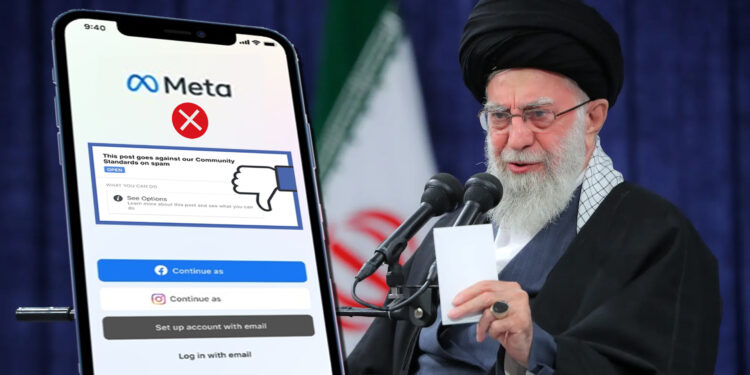by Miceál O’Hurley
TEHRAN — Meta’s social media platforms Facebook and Instagram announced 7 February they had acted unilaterally to “remove” Iran’s Supreme Leader Ayatollah Ali Khamenei’s accounts. According to Agence France-Presse, a Meta Spokesperson announced, “We have removed these accounts for repeatedly violating our Dangerous Organisations and Individuals policy”. Meta had drawn strong criticism for continuing to allow Ayatollah Ali Khamenei to use their social media platforms to articulate Iran’s support for Hamas in the aftermath of the 7 October 2023 attacks upon Israel.
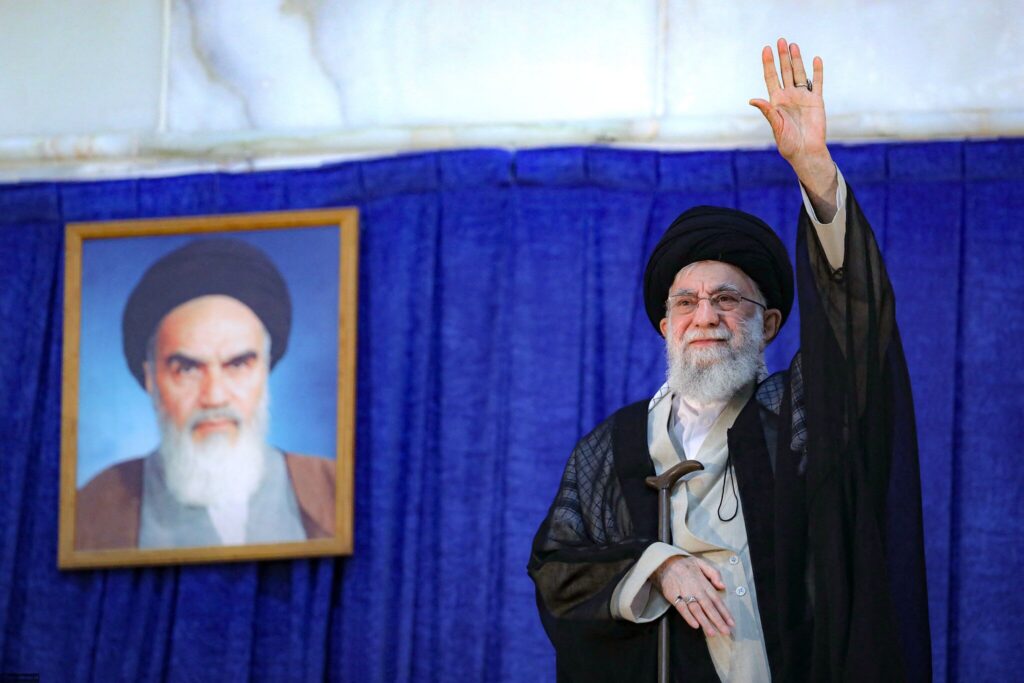
The move by Meta, a publicly traded corporation, further isolates un-mediated access to direct information from Iran’s senior leadership. At a time when regional tensions are possibly at their highest since the 1973 Yom Kippur War (Ramadan War) and certainly since the November 1979 storming of the U.S. Embassy in Tehran, the further demise of unfiltered information directly from Iran and its leaders adds nothing to the West’s ability to better understand Iran. While social media platforms have a responsibility to keep their platforms from being flooded with content contrary to their policies, restricting direct information from Iran’s leadership can only further serve to undermine the world’s ability to make determinations based on original source information. ‘X’, formerly known as Twitter, continues to provide access to Iran’s Supreme Leader and many Islamic Revolutionary Guard Corps (IRGC) channels despite intense pressure from pro-Israeli and other Western platform users.
Reliable Information Deficits Have Driven Defective Media Reporting
Restricting Iran’s access to the West’s legacy and social media, by design or in practice, has generally served to work against Western interests. In December 2022, the NYTimes ran with a story claiming Iran had caved to international pressure and abolished their Gasht-e Ershad (translated literally as ‘Guidance Patrols’, ubiquitously called the ‘morality police’ by Western media). The NYTimes relied heavily on a single Iranian, anti-establishment news site and with the information being “corroborated” by what were described as trusted social media posts emanating from inside Iran. The sensational story spread like wildfire across major international media outlets throughout the U.S., U.K., Europe, the Middle East, Asia and elsewhere. Within 24-hours no less than 378-separate media outlets ran with the story in multiple languages. Countless social media users shared the story in their posts proclaiming the demise of the Gasht-e Ershad ensuring extremely wide saturation across the globe. Politicians on 6-continents quickly took to both legacy and social media to proclaim how the policies they championed were having a decided impact on shaping Iran’s domestic policy. Inevitably, some declared the beginning of the downfall of Iran’s Islamic Republic. There was only one problem with the story – it was wrong.
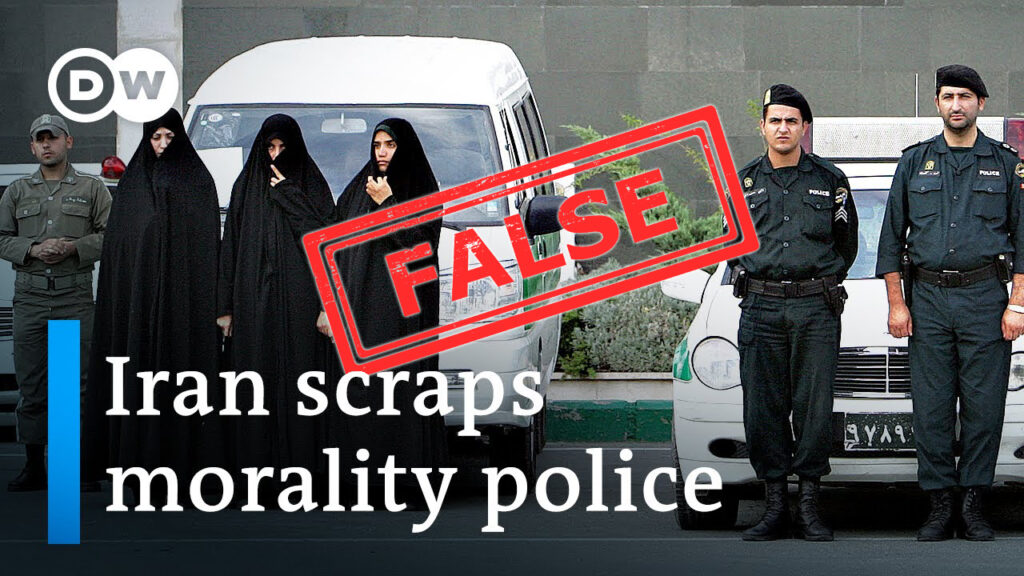
The story claiming the demise of the Gasht-e Ershad was based upon second-hand information from the “pro-reform” media outlet Entekhab. Entekhab, a Iranian “pro-reform” news site that has several times been censored by Iran’s leadership for spreading “false and dangerous information” erroneously reported that Iran’s Attorney General Mohammad Jafar Montazeri claimed Iran’s parliament and judiciary were reviewing the law that requires women to wear a hijab in public. The publication alleged the Attorney General stated with authority the Gasht-e Ershad had been abolished by Iran’s religious authorities. Entekhab was deemed by the NYTimes and legacy media outlets as a reliable source inside Iran based largely upon its supposed popularity with Iranian reformists and its self-pronounced claims to be the most widely accessed media site in Iran. That the publication had several times been censured and taken-down by Iran’s religious authorities, the Supreme National Security Council and Minister of Islamic Culture and Guidance, gave it a varnish of special credibility in the West. There was, in-short, a Western belief that Entekhab had its ‘finger on the pulse’ of Iran and articulated the authentic and reliable voice of the Iranian people. This was self-delusional thinking that would not pass editorial scrutiny applied elsewhere in the world.
For the NYTimes and the hundreds of news outlets that ran with the story it seemed inconsequential that Al-Alam, Iran’s state-run television outlet, immediately disclaimed Entekhab’s reporting saying, “…[someone] tried to misinterpret” Attorney General Montazeri’s comments, further asserting, “The most that can be understood from Mohammed Jafar Montazeri’s remarks is that the morality police’s patrols have not been connected to the judiciary since their inception”. Yet another Iranian media outlet, Student News Network (SNN), known for being overtly conservative and yet uncannily reliable, was unequivocal in reporting the claim Iran was abolishing their Gasht-e Ershad was false. SNN emphasised that Iran’s public hijab requirement was, “still a law in Iran”. Few, if any, took notice nor let these usually accurate sources reporting a message contrary to their editorial views give them reason for pause.
The story was soon undermined by its flimsy foundations and overwhelming contradictory source information. Within only 48-hours Time Magazine published a headline article, ‘Was Iran’s Morality Police Really Abolished? What We Know.’. The original story, while not dead on arrival, had quickly proven patently false. Albeit, little in the way of retraction was published. In many cases the very media outlets that ran with the false report that Iran had abolished its ‘Guidance Patrols’ did nothing to better inform their readers or viewers. Some outlets even attempted to claim Iran had changed its mind because of internal political pressure when, in fact, there had never been a move to abolish the Gasht-e Ershad.
Public Access to Good Information is Central to Democratic Development
In an age when legacy media outlets decry the rise of the rampant social media disinformation injuring the public’s right to fact-based reporting this debacle only highlighted how lazy reporting and failures in editorial control defeated the reliability of professional news sources. It would not be entirely unfair to claim some outlets put their editorial views ahead of responsible reporting. This story, only one of a plethora plagued by this dynamic, illustrates the propensity of Western media and politicians to engage in negative hypothesis building with regard to Iran – reaching a conclusion and excluding any-and-all information that would tend to run contrary to a previously held view.
In this era of technological advancements ensuring the public has direct and timely access to information should be both easy and desirable. Limiting access to first-source information, despite the lofty goal of reducing incendiary language, too often amounts to mere ‘virtue censorship’. Meta was concerned about criticism of Iran’s support for Hamas, the Houthis and its aligned militias in the region and acted at this time in their interests with scant regard for the public’s right to reliable information. The content of Ayatollah Ali Khamenei’s Meta feeds was scarcely different of late than it has been in recent years begging the question as to why Meta felt they must de-platform Iran’s Supreme Leader now. In this U.S. election year Meta wants to be seen to be intolerant of views that many of its users find offensive. Meta gambled that few would decry the demise of free speech or decline of access to first-source information when it comes to heavily sanctioned regimes, like Iran. The public seems inordinately complacent and seems resolved to allow intelligence agencies, media outlets and think tanks that possess the resources to read and interpret foreign language web sites, media releases and press conferences to shape their opinions.
The public’s willingness to relinquish the prerogative to form their own opinions by accessing first-source information in favour of these bodies comes at a time when polling indicates less than half of the public have lost confidence in public institutions. According to the OECD report Building Trust to Reinforce Democracy Summary brief presenting the main findings from the OECD Trust Survey, just over 4 in 10 people indicate high or moderately high trust in their national government. It seems contradictory for the public go submit to their information being derived from the very institutions they no longer trust and this is an issue of concern for seemingly robust democracies. In his cardinal study “Democracy in America,” Alexis de Tocqueville observed the importance of the media in ensuring the democratic body politic was well-informed:
“It often happens in democratic countries that many men who have the desire or the need to associate cannot do it, because all being very small and lost in the crowd, they do not see each other and do not know where to find each other. Up comes a newspaper that exposes to their view the sentiment or the idea that had been presented to each of them simultaneously but separately. All are immediately directed toward that light, and those wandering spirits who had long sought each other in the shadows finally meet each other and unite.”
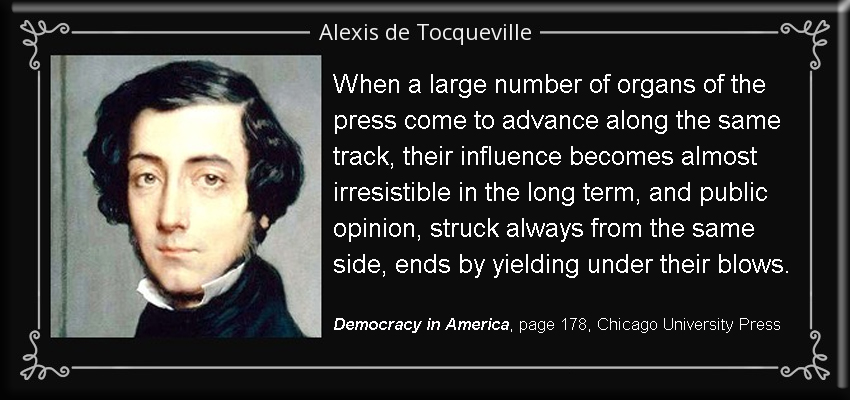 It was as true during the nascent period of American experiment in democracy as it is today that access to information was vital for the proper development of a democratic society. Depriving people of reliable, first-hand information, be it via social or legacy media, can only serve, as de Tocqueville so saliently observed, remand individuals desirous of critical thought, ideas and analysis to remain “lost in the crowd” living in the “shadows”. A lack of reliable, accessible information is as dangerous to the Western concept of democracy as is the disinformation that is currently causing it to tear at its seams.
It was as true during the nascent period of American experiment in democracy as it is today that access to information was vital for the proper development of a democratic society. Depriving people of reliable, first-hand information, be it via social or legacy media, can only serve, as de Tocqueville so saliently observed, remand individuals desirous of critical thought, ideas and analysis to remain “lost in the crowd” living in the “shadows”. A lack of reliable, accessible information is as dangerous to the Western concept of democracy as is the disinformation that is currently causing it to tear at its seams.
If Iran Wants to Be Heard and Understood Media Access is Essential
The unity of Western ideas and democracy cannot be achieved by the restraint of access to first-source information. It requires the media to provide information for the public “simultaneously but separately” that each person might be empowered to develop their own individual views. Cutting off Iran’s Supreme Leader from access to social media platforms may give the Meta specifically, and the West generally, the feeling of serving the public good. Who in the West will complain given Iran’s propensity to incessantly shout, “Death to America” and “Death to Israel”? The bi-product of that censorship, however, is the great sacrifice of allowing individuals to form their own opinions, un-mediated by their Government and media outlets. The media, in adopting their Government’s hostility to Iran, combine to deprive the people of any ability to form their own opinions and this is a disservice to and by the media. It is not surprising, therefore, that people who distrust establishment sources become either so complacent the choose to ignore how the information controlled by establishment effects their lives or they become hostile to that information and embrace opposing views based not on the merit of what they read and hear but because it smacks of some perverse sense of exercising liberty.
Where direct information ought to be available to a democratic society a confluence of competing interests influence make first-source, reliable information a genuine scarcity. The consequence of this dynamic is that it provides an ongoing basis for misunderstanding, misinterpretation or outright self-delusional thinking. Inevitably poor policy-making and decisions by the institutions, the military and politicians who must live and function in a world in which, for better or worse, Iran is an active player is a natural bi-product.
Tension Between Iran’s Press Guarantees and Conduct That Chills Reporting
The West does not alone carry the burden of failure to address the problems caused by a lack of access to reliable, first-source information. Iran has been its own worst enemy at times. The same revolutionary fervor enshrined in the Islamic Republic of Iran’s Constitution which sought to raise-up and free the Iranian people from the stranglehold imposed by the former Shah has fallen particularly short of its ideal. Iran Article 24 of the Constitution of the Islamic Republic of Iran states:
Chapter III The Rights of the People Article 24 Publications and the press have freedom of expression except when it is where there is infringement of the basic tenets of Islam or public rights. In this respect detailed provisions will be laid down by law.
However, the 1986 press law (amended in 2000; and, again in 2009 to encompass online publications), authorises Iranian authorities to ensure journalists do not “endanger the Islamic Republic… [and] do not offend the clergy and the Supreme Leader; [or] …spread false information”. Unsurprisingly, these broad, vague and arbitrarily prohibitions leave Iran’s domestic media complaining they are prohibited from exercising the very “freedom of expression” guaranteed in their Constitution.
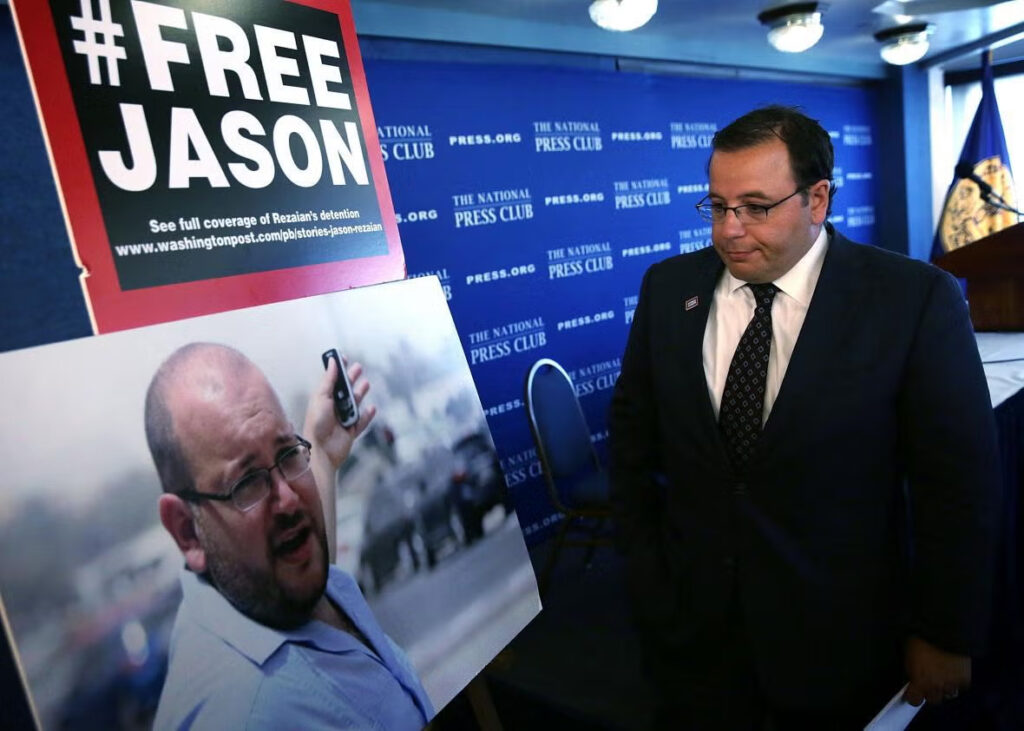
International media argue they are no less cowed from legitimate reporting on Iran than Iran’s domestic press corps. Tensions run so high that few Western media outlets have a physical presence in Iran. In a chilling act to the West’s ability to exercise their right to a free press in Iran first-and, the Washington Post’s Tehran Bureau Chief Jason Rezaian, along with his journalist wife, was arrested in 2014. Rezaian holds dual U.S. and Iranian citizenship. Resaian’s wife, Yeganeh Salehi, was a journalist for the United Arab Emirates based publication the National.
Selehi was released in 2014. Resaian went on to spend 544 days in an Iranian prison. Rezaian was convicted of “espionage” in 2015, during a closed-door Revolutionary Court trial. He was eventually released in an exchange in 2016. As part of Resaian’s release it was announced he would be allowed to leave Iran along with another 3-American prisoners along with the West’s exchange of seven Iranian prisoners and the dismissal of charges against fourteen other Iranians. America released some $1.7 billion in frozen Iranian accounts on the day of Resaian’s release though this was not specifically announced as part of the release deal.
The Committee to Protect Journalists (CPJ) claims Iran is responsible for the death of 5 journalists with a further 17 others detained. By comparison, the CPJ notes Russia is responsible for the death of 59 journalists, 22 being detained with another 7 missing. While Russia has banned Meta’s Facebook in the Russian Federation Meta has no not unilaterally removed Putin from its platform despite claims he has engaged in genocide in Syria and Ukraine and is wanted for arrest in The Hague for have orchestrated the kidnapping of children from Ukraine. In Gaza, the CPJ reports in the aftermath of Israel’s invasion of Gaza as part of its War on Hamas at least 85 journalists and media workers have been killed since 7 October 2023. Despite the disproportionate harm to journalists in Gaza Meta has not removed Israeli Prime Minister Benjamin Netanyahu’s Facebook account despite the International Court of Justice having found grounds to allow South Africa’s claims that Israel is committing genocide to proceed; warning Israel that it is acting to de-humanise the Palestinian people; and, Netanyahu along with his ‘War Cabinet’ colleagues continually calling for the “voluntary emigration” and removal of the Palestinian people from their homeland. Meta is clearly not driven by ideology, values or morality but rather is acting acting with calculation in their corporate good to preserve their revenue stream in the face of public pressure in the aftermath of Hamas’ horrendous attacks on Israel on 7 October 2023. There will be little outcry given that Facebook is banned in most anti-Western regimes like Iran, Syria, Russia and North Korea so Meta will be playing to a captive audience.
Iran’s media relations problems are not confined to its territory. In January, Britain acted to sanction Iranian officials over what they described as plots to kill journalists on British soil. According to the Foreign Office, the British sanctions were coordinated in cooperation with the U.S. to target 7-individuals and 1- organisation – Iran’s Islamic Revolutionary Guard Corps (IRGC). Britain acted after and ITV investigation claimed IRGC Unit 840 was complicit in plots to kill 2-Iran International television presenters based in the U.K. Britain’s Foreign Secretary David Cameron spoke to the issue late last month saying, “The Iranian regime and the criminal gangs who operate on its behalf pose an unacceptable threat to the UK’s security…. Today’s package exposes the roles of the Iranian officials and gangs involved in activity aimed to undermine, silence and disrupt the democratic freedoms we value in the UK”.
Iran categorically denies ITV’s accusations and condemns Britain’s sanctions. A spokesperson for the Embassy of the Islamic Republic of Iran in London said they “categorically reject” the findings of ITV News’ report, calling it “baseless accusations“:
"The unsubstantial claims presented in the above mentioned report are not only devoid of factual merit but also appear to be rooted in preconceived notions and a Hollywood-style narrative to pursue their malicious scheme and goal against the Islamic Republic of Iran which was in the agenda of some war mongers inside the UK for a while. Iran as a responsible and transparent state is committed to its obligation according to international law and norms to not interfere in the internal affairs of any country. It is disheartening to observe commissioned reporting that exemplified by the recent ITV coverage, is not only condemned by strongly rejected."
Iran privately complains Britain’s timing of the accusations and sanctions conveniently coincide with Britain’s strikes on the Iranian-aligned Houthis operating in Yemen. Britain has participated in a number of strike packages in Yemen aimed at securing freedom of navigation in the Red Sea by degrading Houthi offensive capabilities. Moreover, Meta’s decision to de-platform Iran’s Supreme Leader Ayatollah Ali Khamenei from their social media services is claimed to be retribution for Iran’s support for Hamas and the Palestinian people in the aftermath of the 7 October attacks on Israel.
Cuban Missile Crisis Gives Lesson on Necessity of Good Information and Diplomatic Relations
While both the West and Iran remain steadfast in their cycle of accusations and denials it is inescapable that a deficient understanding of Iran’s people and their political leadership due to a deficit of direct, unfiltered, first-person information from Iran is a recipe for continued conflict. There is a necessity for the West to be open to hearing from Iran, even if what emanates from within the country isn’t always what it wants to hear. That is not to say that hate speech and the promotion of violence are acceptable (Iran would no doubt point to bellicose and inciting language from the West on social media that is tolerated, if not promoted). And in the aftermath of Tucker Carlson acting as a propagandist instead of a journalist in his powder-puff interview with Russia’s Vladimir Putin it is clear that good, insightful and responsible journalism is required.
Likewise, Iran must be willing to tolerate a free and responsible media without fear of arbitrary detention. Iran is a sophisticated culture filled with highly educated people. Still, its political leadership has failed to embrace the idea that its ability to directly influence people across the globe can only be served by ensuring journalist enjoy relatively free access to operate in Iran. Few people around the globe speak Farsi, understand the nuances between Sunni and Shia Islam that drives regional relations; or, understand the complex history of the Middle East and its people. With direct access to Western social media being diminished the world is by default left to embrace the views of governments, think tanks and media outlets who have the resources to know where to look for information and how to interpret and claim an in-depth understanding of Iran’s language, religion, culture and history. It is unsurprising that so many people simply adopt other’s views or turn-off to issues relating to Iran altogether simply because they can’t pierce the veil of language, culture and reliable sourcing of information. Iran can remedy this themselves by creating a more encouraging climate in which the media can engage with it and give people the ability to develop their own views of Iran to compliment existing institutional sources.
A better understanding between the West and Iran is in everyone’s interest. The region is engulfed in conflicts inflamed by Israel’s war on Hamas and made inordinately complicated by the multitude of militia actors in Iraq, Syria and Lebanon opposed to Western objectives. The continued threat by the Iran-aligned Houthis to international freedom of navigation near the Red Sea’s Bab al-Mandeb Straight has driven shipping costs to near pandemic level highs and the disruption to the supply chain is already showing. The region is primed for a wider and greater conflict a remedy for which would be an improved understanding achieved by a free press and enhanced diplomacy.
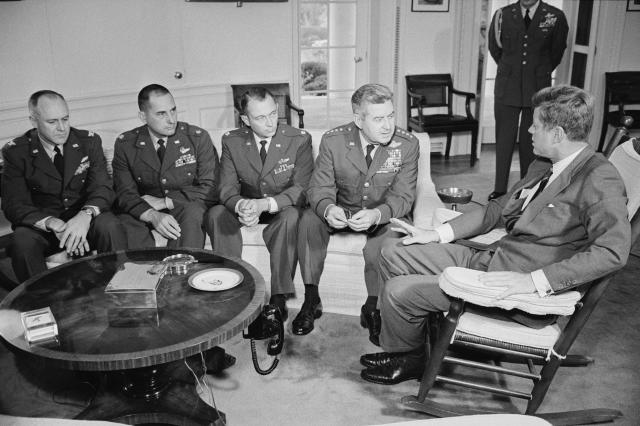
President Kennedy was keenly aware during the Cuban Missile Crisis that poor understanding and miscommunication were ingredients for disaster. According to contemporaneous notes taken by the Executive Committee (EXCOM) at the height of the crisis an American U2 spy plane operating out of Alaska accidentally flew off-course entering Soviet air space. Siberia’s Soviet air force command scrambled MIG fighters over the Bearing Sea to intercept and down the U2. The misstep of the U2 over the Artcic, an entirely different theatre of operation from the Caribbean centred nuclear showdown risked triggering a global nuclear response.
Inside the Kremlin there was near-consensus the US was launching an all-out preemptive attack on the Soviet Union in retaliation for Soviet Premier Nikita Khrushchev positioning nuclear capable missiles in Cuba to threaten the U.S.. Kennedy rightly worried this mere intelligence overflight might send the world into nuclear conflagration, saying, “There’s always some SOB who doesn’t get the word.”
Soviet fears were not entirely unfounded. The world was within hours of the U.S. following Air Force Chief of Staff General Curtis LeMay’s recommendation to execute OPLAN 312 [full-scale air strikes on Cuba] followed by OPLAN 316 [a ground-invasion of Cuba]. The stakes for the world were extremely high. In the end, Kennedy defused the tension by using his brother, Attorney General Robert Kennedy, to communicate via back-channels with Soviet Ambassador Anatoly Dobrynin. In a lunch-meeting at Washington, D.C.’s Occidental Grill Russia’s Counsellor at the Soviet Embassy, Aleksandr Fomin even sought out ABC Correspondent John Scali to serve as a back-channel to the White House in an attempt de-escalate the escalating situation. In the end, Khrushchev recalled the offensive nuclear missiles from Cuba and Kennedy pledged to avoid an invasion of Cuba and pledged to recall U.S. Jupiter missiles stationed in Türkiye.
If Kennedy could parlay with Khrushchev at the height of the Cold War to avoid catastrophic consequences it is imperative the West and Iran must find a way to enhance diplomatic engagement to keep the conflict in Gaza from engulfing the region. There seems to be little interest in recalling that the near destruction of our planet in the Cuban Missile Crisis was the catalyst for the Soviets and Americans to abandon the cycle of head-to-head conflicts and enter a period of cooperation on issues of mutual interests thus ushering in the Nuclear Test Ban Treat and paving the was for nuclear arms reduction talks and treaties that made the world a much safer place. Both Iran and the West much come to terms with the idea that a mutuality of interests can be addressed despite the chasm that may exist in their world views, religious outlook and political ideas.
The muscular confrontation between Iran and the U.S. since the 1978 Revolution has been costly to both nations, restrained regional development and has been of no service to humanity. It may be hard to get Iran to listen to diplomatic overtures after mutual cooperation achieved the JCPOA only to have it dashed by U.S. President Donald Trump’s unilateralism. Despite international verification that Iran was abiding by the terms of the JCPOA Trump unilaterally withdrew from the deal and put pressure on Western partners to do the same. Without reliable partners in the international community the West has pushed Iran into a more aggressive posture driving perpetual conflict where a via media was in everyone’s interest and diplomacy provided a path forward for all.
“Passing Messages” is No Substitute for Face-to-Face Engagement During Crisis
On 4 February appearance on This Week with George Stephanopoulos, U.S. National Security Advisor Jake Sullivan was asked, “How – how much direct contact has there been with Iran to try to contain this conflict?” Sullivan answered Stephanopoulos:
"Over the course of the past few months, we’ve had the opportunity to engage in the passage of messages back and forth between the U.S. and Iran. But, in the last few days, the message that we have sent to Iran has been through our action, not through our words”.
The reduction of diplomatic exchanges between the U.S. and Iran being reduced to the “passage of messages back and forth” and relying on “actions” – a blunt reference to U.S. retaliatory strikes on Iranian-backed militias – to shape relations only further illustrates how a lack of direct access by the media at a time when each State refrains from direct engagement makes an already fraught situation all the more precarious and dangerous.
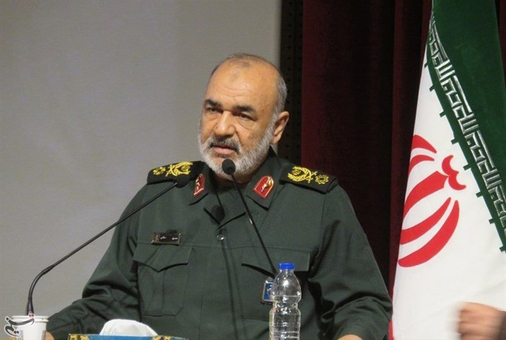
The alternative to diplomacy has been the continued resort to the exercise of muscular martial operations of the type which has kept Iran and the West engaged in a de facto un-declared state of warfare since 1979. Given each State’s influence in the region normalising an enhanced relationship between Iran and the West is necessary. The martial paradigm enunciated by U.S. Secretary of Defense Lloyd Austin in the aftermath of Iranian-backed militias’ killing of 3-U.S. service personnel in Jordan last month has further relegated relations to mere brute physicality, “They have a lot of capability; I have a lot more”. Iran’s IRGC Commander-in-Chief Major General Hossein Salami responded as expected, “We hear threats coming from American officials, we tell them that they have already tested us and we now know one another, no threat will be left unanswered”.
In a striking example of how each side sees each other Iran’s former Ambassador to Ireland, His Excellency Dr. Masoud Eslami, once observed to me:
"To the US government everything looks like a nail because it has nothing in its toolbox but hammers. The extremist and abnormal policy of “maximum pressure” has to stop. We want to see normal behavior being conducted by the next US administration."
Both Iran and the U.S., and the West in general, need to lay the groundwork for a more peaceful and prosperous region based on cooperation, even where significant difference in ideology will endure. Proximity of interests and regional relations can only be improved by more robust cooperation on mutual interests.
Making Room for Media to Play its Proper Role
A truly independent media, operating free of the threat of oppression or imprisonment, is critical to all world communities. The public deserves to enjoy a better understanding of each other and the situations that attend their interaction with other nations. Lacking a robust Western media presence in Iran and with a private company unilaterally banning Iran’s Supreme Leader from its platform, the world has little choice but to try reading the ‘tea leaves’ of in the cups of biased social media platforms who are primarily relied upon because their political views and opinions coincide with stereotypical Western ideology. The lesson the erroneous NYTimes reporting on Gasht-e Ershad that spread like wildfire across Western media platforms taught is that in the absence of first-person reporting errors may not only occur – they are likely to occur.
If the West ensures social and legacy media access by Iranian leaders rand a reciprocal posture by Iran is made to guarantee a free press so fundamental to social development an improvement in international engagement is possible. Much has transpired since the demise of U.S.-Iran relations in 1978. After more than 45-years neither the American or Iranian people are the same, both have evolved for better or worse and moved on. What remains surprising, however, is how politicians, policy-makers and the media seems transfixed nurturing an archaic view of the other fixed-in-time by painful events and people largely gone from the public stage. It must be recognised that a normalisation of relations between these two opponents is unlikely in the short-term despite the need for immediate cooperation on matters where each shares a common interest. Keeping the conflict in Gaza from widening into regional conflagration and bringing a halt to the abhorrent death toll being suffered by the Palestinian people might be a good place to begin.
































